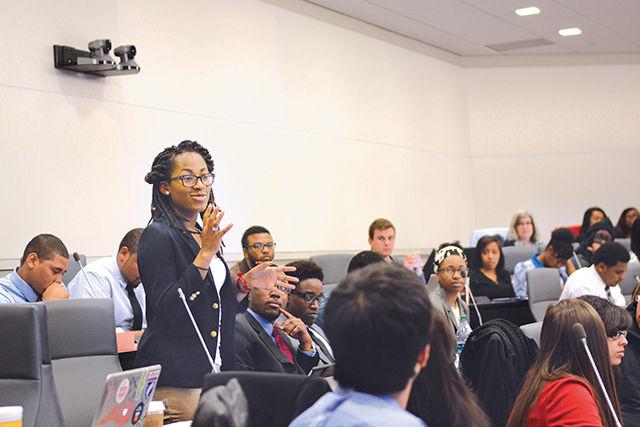
Vibhavari Vempala
Ivana Mbullah, a junior studying textile technology, talks about Columbus Day and the inclusion act at the Student Senate meeting in Talley Student Union Wednesday.
The Student Senate passed a non-binding resolution Wednesday to send a letter to the university asking for an official university calendar change that would remove the federal holiday Columbus Day and replace it with Indigenous Peoples Day.
Student Body President Rusty Mau has not yet signed the bill. He has 10 academic days until Feb.18 to either sign it, let it pass without signing it, or veto it. Mau said he plans to sign the act at the next Student Senate meeting.
During a meeting of the Executive Cabinet Committee on Thursday, Student Senate President Cody Long said that he would vote against the resolution if he had a choice, but he stands by the decision of the Student Senate and Mau.
Long said that without Columbus’ historical contribution to the founding of the United States, the country would not be the same. The country still celebrates Presidents’ Day despite many presidents’ flaws because people revere them for their historical contributions to the legacy of the U.S., Long said.
Columbus Day was officiated as a federal holiday in 1937 to honor Christopher Columbus who established a European presence in the Americas when his fleet of ships landed on the continent in 1492.
In primary school, many students learn that Columbus discovered the Americas, which is incorrect because the land had already been occupied by advanced societies for thousands of years, said Karli Moore, the senator who introduced the Indigenous Peoples Day Celebration Act and a member of the Lumbee tribe of North Carolina.
Columbus Day is a controversial holiday because European settlement in the Americas led to the demise of the history and culture of indigenous peoples. A delegation of indigenous tribes first proposed Indigenous Peoples Day to the United Nations in 1977 as a way to reeducate the world about what actually happened when Columbus came to the Americas, according to Moore.
While indigenous people deserve a day to be recognized, Columbus Day commemorates the historical foundation of the United States, Long said.
Priya Loganathar, a student senator and a freshman studying human biology, said, as an international student, Columbus was a key figure when she learned about the history of America.
Loganathar proposed an amendment to the bill that would create an Indigenous People’s Day without removing Columbus Day, but which was not supported by any other senators.
“I completely respect the fact that this bill is against racism toward indigenous people, but we are removing a day that was significant in history,” Loganathar said.
The bill was inspired by a similar change recently enacted by the city of Seattle. Many other universities such, as Arizona State University and the University of New Mexico, have also passed similar legislation on their campuses.
The resolution would be seen as an effort from NC State to increase and promote diversity, fix some of the miseducation surrounding Columbus, take away the celebration from Columbus and replace it with acknowledgement and celebration of indigenous peoples, Moore said.
“We can take one small step and join the others that have done this and show the world that we appreciate the indigenous peoples of the world,” Moore said.
Some students who opposed the bill argued that this holiday is part of their personal history. Students with this concern said they did not celebrate Columbus Day, according to Moore.
“When the notion of taking it away some people were hesitant because they said it was part of their culture,” said Moore.
The bill attempts to tell history from another point of view, not rewrite history, as Native Americans relied heavily on oral history which resulted on much of their history during that period to be written from the perspective of Europeans, according to Moore.
“We bust our butts to tell others we are alive and that we’re here and about the tribes in North Carolina and the history of our people,” Moore said.
Sixteen states currently do not celebrate Columbus Day, according to an October CNN article .
Megan Jones, senior studying environmental engineering and president of the Multicultural Greek Council, said the bill will raise awareness about the Native American presence on campus.
Brittany Hammonds, the president of Alpha Pi Omega Inc. and a senior studying mathematics education, said changing the holiday should be a no-brainer.
“We don’t ask African Americans to celebrate the day that slavery began, or we don’t ask them to celebrate anything dealing with slavery, and yet people ask us to be okay with the fact that people celebrate the man who came over and claimed to discover a nation that was already here and already functioning,” Hammond said. “Nothing about that is even appropriate.”
Moore said the only program she has seen about Columbus Day at the university was a panel discussion put on by the Office of Institutional Equity and Diversity called the Miseducation of Columbus.
Kelly Elder, a junior studying political science and co-sponsor of the bill, said that since no one celebrates Columbus Day, why not turn it into a positive day rather than, as one of the speakers at the committee meeting said, “a slap in face” to Native Americans.
“The day-name change on our campus would promote the education of the rich history of the native people rather than reminding those people of the negativity that happened in this country,” Elder said.